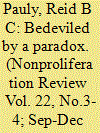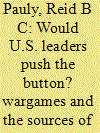| Srl | Item |
| 1 |
ID:
144291


|
|
|
|
|
| Summary/Abstract |
This article explores how two influential American policy makers—Paul Nitze and McGeorge Bundy—wrestled with the idea of a norm against the use of nuclear weapons. Existing scholarship has overlooked how both Bundy and Nitze came to understand the idea of nuclear non-use, especially related to the credibility of threats to use nuclear weapons. Using documentary evidence from their personal papers, this article illuminates the thinking of Bundy and Nitze, finding that both engaged with the idea of a norm of non-use of nuclear weapons in their strategic writing and thought.
|
|
|
|
|
|
|
|
|
|
|
|
|
|
|
|
| 2 |
ID:
162678


|
|
|
|
|
| Summary/Abstract |
Why since 1945 have nuclear weapons not been used? Political scientists have cited five basic reasons: deterrence, practicality, precedent, reputation, and ethics. Scholars attempting to weight these factors face a dearth of empirical data. Declassified records of political-military wargames played by U.S. policymakers, however, open up new avenues for theory testing. An investigation of the willingness of U.S. “strategic elites”—experts with experience in diplomatic or military strategy—to use nuclear weapons in a sample of twenty-six political-military wargames reveals that elite players were reluctant to cross the nuclear threshold against both nuclear-armed and nonnuclear-armed adversaries. The only uses of nuclear weapons in the sample occurred in two wargames with nuclear adversaries. Players’ arguments for restraint in the wargames invoked reputational aversion: decisionmakers feared the opprobrium they would face if they used nuclear weapons. Wargame records also strongly support the power of deterrence and basic practicality—whether conventional weapons could accomplish the same goals—as reasons for widespread hesitation to use nuclear weapons. Precedent and ethical aversions to using nuclear weapons were less common. Finally, players also demonstrated some conformity to what they thought the president expected of them.
|
|
|
|
|
|
|
|
|
|
|
|
|
|
|
|